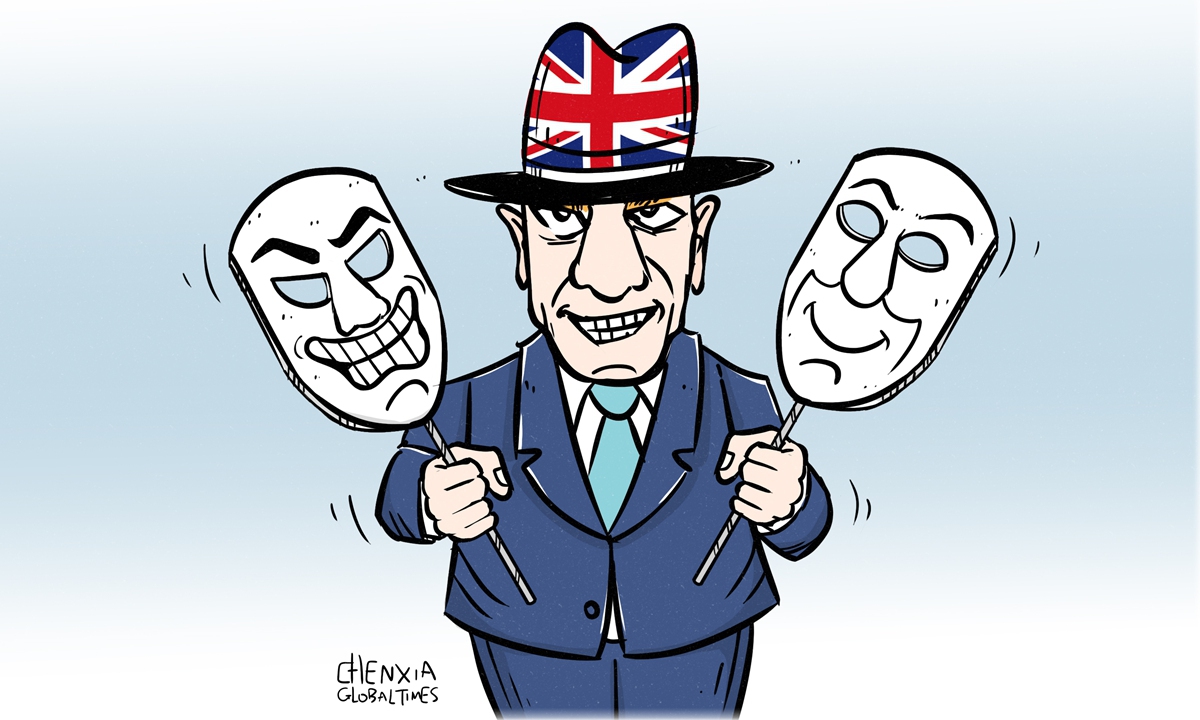GT Voice: AI summit a litmus test for UK approach toward China

Illustration: Chen Xia/Global Times
China is expected to attend the UK's summit on artificial intelligence (AI) at Bletchley Park in November, the Financial Times reported on Wednesday, citing British and Chinese officials.
But there's still uncertainty, "given Washington's efforts to squeeze China's access to chip technologies that underlie AI development, and criticisms from some British and European politicians over China's attendance," since China hasn't confirmed its attendance yet.
This shows that the UK faces an awkward choice between its objective needs and geopolitical bias. Still, the summit could be a litmus test of whether Britain's approach toward China is turning rational and pragmatic.
The UK's ideological bias against China under Washington's geopolitical influence has long been a problem in bilateral cooperation. For instance, a report by The Guardian revealed last month that Chinese officials might only be allowed to attend the first day of the two-day summit, in part because of concern over so-called spying activities.
However, the fact that the UK still invited China, despite the criticism and concern, shows clearly that the British are well aware that China is an important player in the AI area. They cannot afford to exclude China at a time when Prime Minister Rishi Sunak is trying to preserve Britain as a technology hub by seizing the opportunity of the upcoming AI summit to make his country a global leader in regulation of the sector.
According to the Tortoise Media's fourth edition of The Global AI Index, released in June, the UK ranks fourth in terms of global AI development, following the US, China and Singapore. With its complete AI industries, huge market size, sufficient research talent, large-scale computing power and application scenarios, China is already a very important force in global AI development.
Against this backdrop, there is no way the US and its Western allies can set up a system of AI management and regulation while squeezing China out, as it would make no sense if global AI governance loses China's participation or backing. This is also why it is still not possible for the UK or the West to formulate their own norms without input from China, even as Washington tightens its control over China's access to AI technology.
AI is not the only area where the Sunak government needs China's participation, despite domestic discontent. There is growing awareness that the UK cannot afford to alienate China in trade, too.
It is also true that China-UK relations have shown signs of improvement. In August, James Cleverly, the UK foreign secretary, visited China, the first such trip to Beijing in five years by a UK foreign secretary.
In September, Premier Li Qiang met with Prime Minister Sunak on the sidelines of the G20 Summit in New Delhi, India.
Moreover, a Politico article this week disclosed that the Sunak government is examining several options for strengthening economic ties with China, including the revival of ministerial-level trade talks. While it is hard to tell whether the report is true or just another trial balloon, it at least reflects Britain's willingness to strengthen economic and trade ties with China, despite complicated domestic and geopolitical factors.
Anyone with a basic knowledge of China-UK economic ties would understand that the UK's development cannot be separated from cooperation with China. In the past, although China and the UK had different views on some political issues, it didn't hinder normal economic exchanges.
The UK's pragmatic attitude toward China has benefited businesses from both countries. Yet, under the value-based diplomacy of some British politicians, the UK has gradually deviated from the pragmatic foreign policy.
But Chinese manufacturing and British manufacturing have become intertwined closely for mutual benefits, and the attitude of the British business community, despite the resistance from politicians, is the best proof that the UK economy needs cooperation with China to gain more growth momentum, especially in difficult times.
Photos
Related Stories
- China launches Global AI Governance Initiative, offering an open approach in contrast to US blockade
- China launches initiative to address universal concerns over AI development: spokesperson
- China New Growth: Large language models lending hand in healthcare scenarios
- AI program developed by students benefits goose farm
- AI foundation models help China's auto industry get smarter
- Over 800 projects from universities displayed at China Int'l Industry Fair
Copyright © 2023 People's Daily Online. All Rights Reserved.









